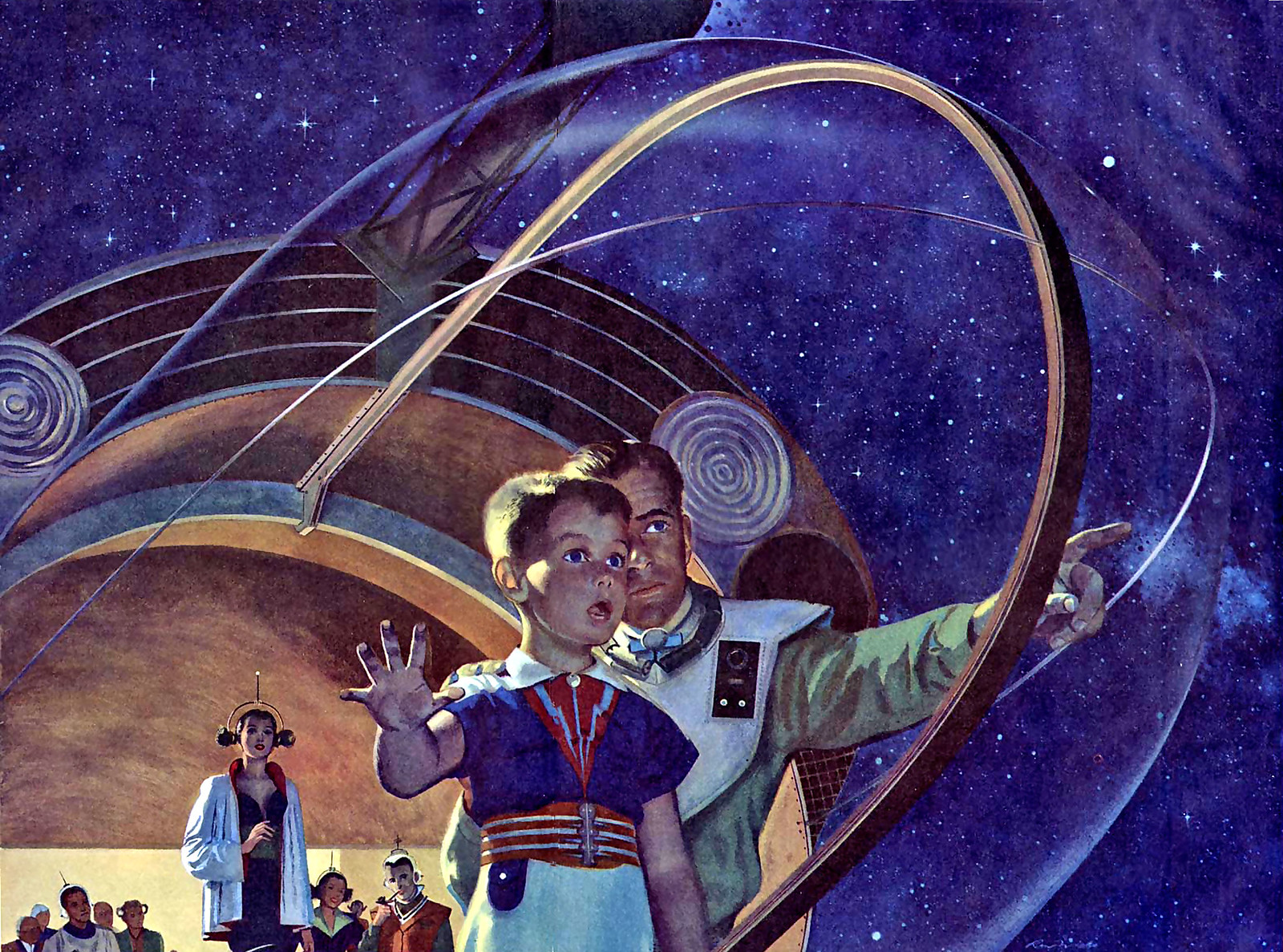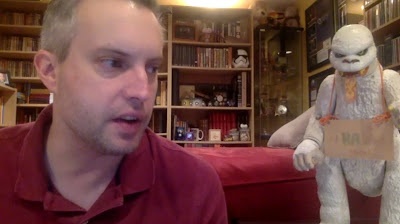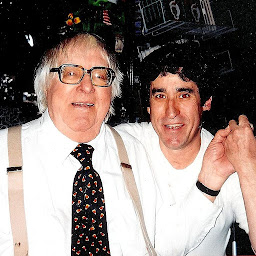The great science fiction writer, historian, editor and educator James E. Gunn has passed away at the grand age of 97. Jim was still an active professional author, with his Transcendental trilogy being published in the 2010s, and his latest short fiction appearing in Asimov's magazine just this year.
Jim was one of the few surviving writers from the original heyday of science fiction: he had two short stories published in pulp magazines in the 1940s (one in Startling Stories and one in Thrilling Wonder Stories). He was just three years younger than Ray Bradbury and Isaac Asimov.
Back in the 1980s, when I was heavily into science fiction literature, Jim's novel The Listeners was one of my favourite books. Not only did it have a great science-fictional premise - scientists listening out for signals from other star systems - it was clearly informed by what was going on in the real field of SETI, the search for extraterrestrial intelligence. It was a lot less flashy than Spielberg's Close Encounters of the Third Kind, but a lot more convincing.
But where James E. Gunn had the greatest effect on me was with his historical study of origins and development of science fiction. His terrific anthology series The Road to Science Fiction not only told the story of SF, it set out to demonstrate it through judicious selections of text from early, proto-SF through to modern day works.
Seven years ago, I was delighted to meet James Gunn at a conference, and I blogged about it afterwards. I can think of no better tribute than to re-run that blog post. So here it is, from 26 August 2013.
- - - - - - - - - - - - - - - - - - - - -
 |
| (Pictured at the James Gunn panel are (from left to right) Nathaniel Williams, Michael Page, James Gunn, Chris McKitterick.) | | | |
One of the delights of this year's Eaton Conference in Riverside,
California, was the opportunity to meet the incredible James Gunn.
What's so incredible about James Gunn? For starters, he's ninety years
old this year, but could easily pass for twenty years younger. More
importantly, though, he is what one conference speaker called "a triple
threat": not only a successful author of science fiction, but a
successful teacher of SF and creative writing, and a successful critic
and historian of SF.
While other significant genre figures were associated with the Eaton
Conference because they were to receive awards - Ray Harryhausen, Stan
Lee and Ursula Le Guin all received Eaton Awards this year - Gunn was
present because there was going to be a panel discussing the three
strands of his career. The panel was part academic study, part
reminiscence from those who have worked with Jim , and all celebration
of his life and work. (The panel organisers told me they were inspired
to do this by the Ray Bradbury tribute events I organised for last
year's SFRA conference in Detroit.)
Apart from my ongoing interest in Bradbury and Harlan Ellison, who in any case I see as master fantasists rather
than science fiction writers, I have been quite distant from the
science fiction field for a number of years. But there was a time when I
was fascinated by the genre, and particularly by its history as a
literary genre that seemed to emerge alongside the industrial
revolution. Around 1980, when I was a student (for the first time; I
still am a student!) I discovered Gunn's book The Road to Science Fiction: From Gilgamesh to Wells.
This was a remarkable book, which suddenly gave me that historical
insight, where previously I just had a fractional and fractured
knowledge of what SF was. Gunn wrote a clear history, in plain English
and short chapters, and then gave the reader substantial excerpts from
key texts to illustrate the points he was making about the emergence of
the genre. It was, and remained, and excellent way of learning about how
and why the genre came into existence. I would later learn that there
are other interpretations of the emergence of the genre, but that
doesn't matter.
Shortly after, I discovered there was a second volume to The Road to Science Fiction, subtitled From Wells to Heinlein; and a third, From Heinlein to Here.
(And a fourth, and some time later there were yet more.) For anyone
looking for a history of the genre, I still recommend this series, and they have remained in print.
One additional stroke of genius in the first volumes of the series was
Gunn's inclusion of lists of recommended SF works and SF writers for
further reading. I worked through these lists systematically over the
next couple of years, a far more difficult task in those pre-internet
days than it would be today.
I don't recall whether Gunn included any of his own works in the
suggested reading category, but for some reason I was prompted to also
sample his fiction. The Listeners appealed to me from its plot
description as an account of scientists engaged in the search for
extraterrestrial intelligence, and when I read it I was blown away by
both the ease and artistry of the book, particularly its first chapter.
Later I would track down as many other Gunn books as I could, and have
fond memories of The Joy Makers, The Immortal, Crisis, and This Fortess World (which I was fortunate to find in a hardcover first edition from 1955).
At the Eaton Conference, Gunn explained that his career wasn't planned,
but he just took opportunities as they arose. His response to each offer
that came his way was, "Why not?" Thus it was that he came to be
working at Kansas University by the mid-1960s, and later set up the
first academic courses in SF, and the first research centre for SF (take
a look at About SF for the present incarnation of what he developed at KU).
I took the opportunity of asking Jim Gunn how he came to collaborate with the legendary Jack Williamson, on the 1954 novel Starbridge.
Jim explained that he attended a convention and, somewhat starstruck,
recognised Williamson from a photograph on the back of a book. He
pointed at Williamson and blurted, "You're Jack Williamson!" Later, he
learned that Williamson was suffering a bout of writer's block, and
Williamson turned over a partially complete version of Starbridge, which Gunn then completed. It was published by Gnome Press, and became Gunn's first published novel.
I couldn't resist mentioning to Jim that I had recognised him in
the lift (elevator!) the day before - and that part of me had wanted to
blurt, "You're James Gunn!", but I was too starstruck to say anything.
As it turns out, Jim Gunn is a charming, modest fellow, and it was
exciting to meet him. It prompted me to take a look again at his books -
and I still find The Listeners to be a remarkable work. Although
it is fantastical, it has one of the best portrayals of scientists and
scientific discovery I've ever seen in a work of fiction. Speakers on
the Gunn panel also commended this as one of his best works - and both
they and the audience members echoed my experience regarding The Road to Science Fiction. It
seems James Gunn has been the gateway to SF not just to me, but to a
couple of generations of SF fans and scholars. Jim talks about his own
involvement with the genre in this recent interview in the Kansas City Star.
And now, in his 90th year, James Gunn has produced a new novel, Transcendental, and he's a Guest of Honour at the World Science Fiction Convention in San Antonio, Texas. Is this what they call a third act?

























